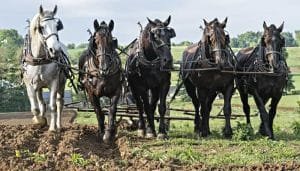Horses have played a pivotal role in shaping agriculture and society throughout history.
From ancient civilizations to modern farms, these majestic animals have influenced everything from transportation and labor to culture and economy. In this blog, we’ll explore the profound impact of horses on agriculture and society, highlighting their contributions and the lasting legacy they’ve left behind.
1. Early Domestication and Agricultural Development
The domestication of horses, believed to have occurred around 4000 BC, marked a significant turning point for human societies. Initially used for their meat and milk, horses quickly became vital to agricultural practices. Their strength and speed enabled farmers to plow fields more efficiently, facilitating larger-scale crop production.
Before horses, most farming relied on human labor and oxen, which were slower and less agile. The introduction of horses revolutionized farming, allowing for quicker planting and harvesting, ultimately leading to increased food production and the growth of communities.
2. Transportation and Trade
Horses revolutionized transportation. As societies developed, the need for efficient movement of goods and people grew. Horses provided a faster and more reliable means of transport compared to oxen or foot travel.
With the advent of horse-drawn carriages and carts, trade routes expanded, linking communities and fostering economic growth. This mobility allowed for the exchange of goods, ideas, and culture, contributing to the development of civilizations.
3. Military Influence
Horses have also played a crucial role in warfare. Cavalry units became a key component of military strategy in ancient and medieval times. The speed and mobility of mounted troops provided a tactical advantage, allowing armies to execute maneuvers and engage in battles more effectively.
The use of horses in warfare not only influenced military outcomes but also affected the social and political landscape of societies. Nations that excelled in cavalry tactics often gained power and expanded their territories.
4. Cultural Significance
Horses hold a significant place in many cultures around the world. They are symbols of strength, freedom, and nobility. In various societies, horses have been celebrated in art, literature, and folklore, reflecting their importance in human life.
Equestrian traditions, such as rodeos, horse racing, and dressage, have become integral parts of cultural heritage. Festivals and events centered around horses foster community spirit and pride, celebrating the bond between humans and these remarkable animals.
5. Economic Contributions
The economic impact of horses extends beyond agriculture and transportation. They have been integral to various industries, including racing, tourism, and recreation. The equine industry generates billions of dollars annually, supporting jobs and businesses ranging from breeding farms to equestrian facilities.
Moreover, horses contribute to agricultural diversity. In many regions, they assist with sustainable farming practices, such as rotational grazing, which improves soil health and reduces erosion.
6. Modern Agricultural Practices

Today, horses continue to play a role in agriculture, especially in sustainable and organic farming practices. Many small farms and homesteads use horses for tasks like plowing, tilling, and transporting goods. This approach reduces reliance on machinery, promoting a more eco-friendly way of farming.
Additionally, horse-powered agriculture has gained popularity among those seeking a more traditional and hands-on approach to farming. It emphasizes the importance of working with animals rather than against them, fostering a deeper connection to the land and the farming process.
7. Therapeutic and Educational Roles
Horses have also made significant contributions to society through therapeutic programs and education. Equine-assisted therapy has proven effective in helping individuals with physical, emotional, and psychological challenges. Programs involving horses promote healing, confidence, and personal growth, particularly for at-risk youth and veterans.
In educational settings, horses are used to teach responsibility, teamwork, and compassion. Many schools and community programs incorporate horseback riding and care into their curricula, providing valuable life skills for participants.




